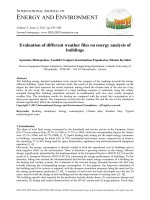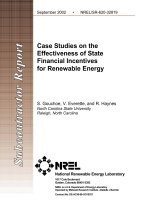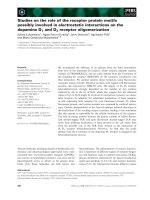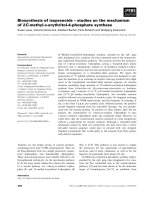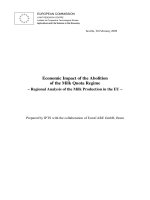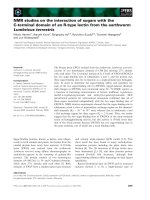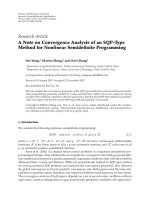Studies on sensory analysis of goat milk basundi with red pumpkin pulp
Bạn đang xem bản rút gọn của tài liệu. Xem và tải ngay bản đầy đủ của tài liệu tại đây (433.33 KB, 5 trang )
Int.J.Curr.Microbiol.App.Sci (2019) 8(9): 2853- 2857
International Journal of Current Microbiology and Applied Sciences
ISSN: 2319-7706 Volume 8 Number 09 (2019)
Journal homepage:
Original Research Article
/>
Studies on Sensory Analysis of Goat Milk Basundi with Red Pumpkin Pulp
P. U. Wakde1*, A. T. Shinde2, R.V. More3 and S. B. Patange3
1
Department of Dairy Science, College of Agriculture, Parbhani-431402, India
2
Department of AHDS, College of Agriculture, Latur, India
3
College of Agriculture, VNMKV, Parbhani, India
*Corresponding author
ABSTRACT
Keywords
Basundi, red
pumpkin, sensory,
goat milk
Article Info
Accepted:
24 August 2019
Available Online:
10 September 2019
The study was conducted on the topic “Studies on Preparation of Goat Milk
Basundi with Red Pumpkin Pulp.” The different levels of red pumpkin pulp
2.5, 5 and 7.5 per cent were tried in goat milk basundi. The product
obtained was subjected for organoleptic evaluation by panel of judges. It
was observed that the colour and appearance score for treatment T0, T1, T2
and T3 was 7.58, 8.60, 8.35 and 7.45, respectively. Flavour score was 7.73,
8.40, 8.35 and 7.55 respectively. Consistency was 7.70, 8.45, 8.30 and 7.35,
respectively. Taste score was 7.75, 8.53, 8.30 and 7.60, respectively. It was
observed that the overall acceptability score for sensory was 7.69, 8.50,
8.33 and 7.44, respectively for T0, T1, T2 and T3. It was clear that the level
of 2.5 red pumpkin pulp have highest overall acceptability.
Introduction
Goats are important component of livestock
industries and play vital role in the social
economic structure of economically weak,
rural community Goat milk differs from cow
or buffalo milk is having better digestibility,
alkalinity, buffering capacity and certain
therapeutic values in medicines and human
nutrition (Haenlein 2004).
The superior digestibility of goat milk, the
proper composition of fatty acids and its
content of bioactive compounds seem to give
properties suitable for treating or preventing
certain medical conditions. Goat milk also has
higher proportions of polyunsaturated fat acid
as well as conjugated linoleic acid. Short and
medium chain fatty acids, as well as medium
chain
triacylglycerols
have
become
established medical treatments for several
clinical disorders.
Goat milk is rich in medium chain
triglycerides, which is one of the primary
reasons that it facilitates improved nutrient
absorption and energy production in the body.
In addition, the medium chain triglycerides
2853
Int.J.Curr.Microbiol.App.Sci (2019) 8(9): 2853- 2857
capric, caproic and caprylic acids, the most
abundant forms found in goat milk, have been
shown to possess antimicrobial activity (Roy
and Vadodaria 2006).
Basundi is traditional, concentrated and
sweetened whole milk product having
sweetish caramal and pleasant aroma, light to
medium brown colour, thick body and creamy
consistency with or without soft textured
flakes that are uniformly suspended
throughout the product.
It contains all the solids of milk in an
appropriate concentration plus additional
sugar and a dry fruit is consumed directly as a
delicious sweet dish. It is most popular in
Maharashtra, Gujarat and parts of Karnataka
and is mainly prepared at home by the
housewives on some special occasions like
Festivals, weddings etc. and relished due to its
rich caramal, pleasant and nutty flavor and
thick consistency (Pagote, 2003).
Among the different vegetables red pumpkin
(Cucurbita moschata) belongs to family
Cucurbitaceae is one of the best-known
sources of beta- carotene, a powerful
antioxidant that gives orange vegetables and
fruits their vibrant colour. Red pumpkin is rich
sources of vitamins-A, C, E and K.
Materials and Methods
Treatment combinations
Following treatment combinations were
considered for preparation of basundi with red
pumpkin pulp.
T0= Basundi from goat milk (control)
T1= Basundi with 2.5 per cent of red pumpkin
pulp by weight of goat milk
T2= Basundi with 5.0 per cent of red pumpkin
pulp by weight of goat milk
T3= Basundi with 7.5 per cent of red pumpkin
pulp by weight of goat milk.
Experimental Methodology
Fig.1 Flow diagram for preparation of
Basundi with Red Pumpkin Pulp.
Basundi was prepared as per the method of
Mukhekar, (2014).
It is excellent sources of many polyphenolic
flavonoid compounds such as alpha, betacarotenes,
cryptoxanthin,
lutein
and
zeaxanthin, carotenes converted into vitamin
A inside the human body.
Biologist suggests pumpkins to be highly
useful for treating hormonal disorders or
adolescent behavior, menopause disorder and
intestinal parasite. Hence considering the
benefits of fiber in the diet, with respect to its
nutritional and medicinal value present study
was proposed on “Studies on Preparation of
Goat Milk Basundi with Red Pumpkin Pulp.”
2854
Receiving of goat milk
↓
Filtration
↓
Standardization of milk (4% fat)
↓
Heating at simmering temperature (80-900 C)
↓
Stirring-cum-scrapping
↓
Addition of sugar (@ 5% of milk) and Red
pumpkin pulp as per treatment
↓
Gentle heating till complete sugar dissolved
and uniform mixing of Red Pumpkin Pulp
↓
Cooling at room temperature and addition of
cardamom (1/2 tbsp)
↓
Packaging and storage of basundi at
refrigeration temperature
Int.J.Curr.Microbiol.App.Sci (2019) 8(9): 2853- 2857
Results and Discussion
Colour and appearance
Sensory evaluation of red pumpkin basundi
The mean colour and appearance score for
control basundi (T0) and basundi with 2.5, 5
and 7.5 per cent red pumpkin pulp (T1 T2 and
T3) is presented in table 1. From the results it
was observed that basundi with 2.5 per cent
red pumpkin pulp scored highest score (8.60)
among all treatments as well as control.
The experimental basundi samples were
served to a panel of semi trained judges for
sensory evaluation such as, colour and
appearance, flavour, body and texture,
sweetness and overall acceptability using “9
point hedonic scale”. The numerical score
given by judges for individual attribute was
computed to obtain mean and these means
were subjected to statistical analysis. The data
was analyzed statistically by using Completely
Randomized Design (CRD) as per Panse and
Sukhatme (1985). Results obtained are shown
in table 1
Flavour
From the results it was observed that basundi
with 2.5 per cent red pumpkin pulp scored
highest score (8.40) among all the treatments
as well as control.
However, treatment T1 and T2 does not differ
significantly from each other. As level of
addition of red pumpkin pulp increased score
decreased significantly from T1 and T3
treatment as well as control samples also
scored. The result is in correlation with
Bhutkar et al., (2015).
Taste
From the results it was observed that basundi
with 2.5 per cent red pumpkin pulp scored
highest score (8.53) among all treatments as
well as control samples. However, treatment
T1 and T2 does not differ significantly from
each other. At higher level of addition of red
pumpkin pulp i.e. 7.5 per cent the score (7.60)
decreased significantly fromT1 and T2
treatment as well as control samples.
However, taste score T0 and T3 treatment are
comparable. The results are in agreement with
previous research workers, Yadav (2015) and
Gite et al., (2017).
However, treatment T1 and T2 does not differ
significantly from each other. At higher level
of addition of red pumpkin pulp i.e. 7.5 per
cent the score (7.45) decreased significantly
from T1 and T2 treatment as well as control
samples. However, colour and appearance
score T0 and T3 treatment are comparable. The
results are in agreement with Bhutkar et al.,
(2015).
Consistency
From the result it was observed that basundi
with 2.5 per cent red pumpkin pulp scored
highest score (8.45) among all treatments as
well as control. However, treatment T1 and T2
does not differ significantly from each other.
At higher level of addition of red pumpkin
pulp i.e. 7.5 per cent the score (7.35)
decreased significantly from T1 and T2
treatment as well as control samples.
However, T0 and T3 treatment are significantly
comparable to each other results are in
agreement with Bhutkar et al., (2015).
Overall acceptability
The mean overall acceptability score for
control basundi (T0) 7.69 and basundi with
red pumpkin pulp T1, T2 and T3 was 8.50, 8.33
and 7.44 respectively. The highest score (8.50)
was obtained for treatment T1 and the lowest
score (7.44) was obtained for treatment T3.
The significant differences were observed in
between the treatment T0, T1, T2 and T3.
2855
Int.J.Curr.Microbiol.App.Sci (2019) 8(9): 2853- 2857
It was predicted from the sensory score of
basundi with red pumpkin pulp that treatment
T0, T1, T2 and T3 differ significantly for these
sensory parameters. The result was in
confirmation with Waghmare (2012) and
Satav (2014) who reported significance effect
of addition of bottle gourd pulp and walnut
powder on the overall acceptability of burfi.
From present investigation it can be concluded
that the red pumpkin pulp can be very well
utilized for preparation
nutritional basundi.
of
palatable,
The sensory score for colour and appearance
as well as flavour was significantly affected
towards higher level of addition of red
pumpkin pulp. While treatment T1 (2.5 per
cent) red pumpkin pulp has highest overall
acceptability and there is good scope for using
red pumpkin pulp in preparation of traditional
dairy products.
Table.1Effect of different levels of red pumpkin pulp on overall acceptability of Basund.
Treatment
Flavour
Taste
T0
T1
T2
T3
S.E. +
C.D. at 5%
7.73c
8.40a
8.35ab
7.55cd
0.065
0.202
7.75c
8.53a
8.30ab
7.60cd
0.097
0.300
Colour and Consistency Overall
Appearance
Acceptability
c
c
7.58
7.70
7.69c
a
a
8.60
8.45
8.50a
8.35ab
8.30ab
8.33b
7.45d
7.35d
7.44d
0.065
0.064
0.042
0.202
0.198
0.129
References
Bhutkar, S S., Patil, D.L., and Rupanawar,
D.A. 2015. Studies on Preparation of
Pedha Blended with Red Pumpkin.
IOSR. J. of Agriculture and Veterinary
Science Volume 8, Issue 3 Ver. I (Mar.
2015), PP : 01-03.
Gite, A.S., More, D.R and Satwadhar, P.N.
2017.
Development
and
Standardization of Custard Apple
Basundi J. of Pharmacognosy and
Phytochemistry; 6 (5): 1170-1172.
Haenlein, G.F.W. (2004). Goat milk in human
nutrition. Small Ruminant Research,
51: 155-163.
Mukhekar, A.S. 2014. Preparation of Basundi
Blended with Mango Pulp cv. Kesar.
M.Sc (Agri.) Thesis, Submitted to
VNMKV, Parbhani.
Pagote, C.N. 2003. Basundi: A Traditional
Delicious Milk Product. Beverage and
Food
World,
30(6):
29.
Panse, V.G., and Sukhatme, P.V. 1985.
Statistical Methods for Agricultural
Workers. ICAR
Publication, New Delhi.
Satav, Y.L., Narwade, S.G., Kadam, R.P. and
Syed I.H. 2014. Effect of walnut
powder incorporation on sensorial,
nutritional and textural quality profile
of burfi.
The Asian Journal of
Animal Science. 9 (2): 129–133.
Roy, S.K, and Vadodaria, V.P (2006). Goat
Milk and Its Importance. Indian
Dairyman 58:
65-9.
Waghmare, V.K. 2012. studies on preparation
of bottle gourd burfi. M.Sc. (Agri.)
Thesis Submitted to MKV, Parbhani
(MS).
Yadav, K.S. 2015 process standardization of
fibre enriched basundi using carrot. M.
Sc. (Agri.) thesis Submitted to MPKV,
Rahuri (MS).
2856
Int.J.Curr.Microbiol.App.Sci (2019) 8(9): 2853- 2857
How to cite this article:
Wakde, P. U., A. T. Shinde, R.V. More and Patange, S. B. 2019. „Studies on Sensory Analysis
of Goat Milk Basundi with Red Pumpkin Pulp. Int.J.Curr.Microbiol.App.Sci. 8(09): 28532857. doi: />
2857
